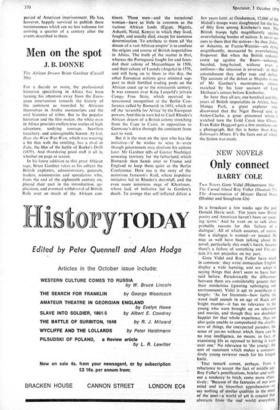Men on the spot
J. B. DONNE
The African Dream Brian Gardner (Cassell 50s) For a decade or more, the professional historian specialising in Africa has been turning his attention away from the Euro- pean intervention towards the history of the continent as recorded by Africans themselves" in Arabic manuscripts and the oral histories of tribes. But to the popular historian and the film maker, the white man in Africa provides endless true stories of high adventure, undying courage, heartless treachery, and unimaginable horror. At last, How the West Was Won, which was wearing a bit thin with the retelling, has a rival in Zulu, the film of the battle of Rorke's Drift (1879). And thundering good stuff it all is, whether on page or screen.
In his latest addition to this great African saga, Brian Gardner takes as his subject the British explorers, administrators, generals, traders, missionaries and speculators who, from the end of the eighteenth century on, played their part in the introduction, ap- plication, and eventual withdrawal of British Rule over so much of the African con-
tinent. These men—and the occasional woman—have as little in common as the various African lands (Egypt, Nigeria, Ashanti, Natal, Kenya) in which they lived, fought, and usually died, except for immense determination. To attribute to them all 'the dream of a vast African empire' is to confuse the origins and course of British imperialism in Africa. The truth of the matter is that, whereas the Portuguese fought for and foun- ded their colony of Mozambique in 1506, and their colony of Luanda (Angola) in 1576, and still hang on to them to this day, the other European nations gave minimal sup- port to their fortified trading posts on the African coast up to the nineteenth century. It was concern over King Leopold's private Congo Free State, which received in- ternational recognition at the Berlin Con- ference called by Bismarck in 1884, which set off the 'scramble for Africa' by the European powers. And this in turn led to Cecil Rhodes's African dream of a British colony stretching from the Cape to Cairo. in opposition to Germany's drive through the continent from east to west.
But it is the man on the spot who has the initiative-7-if he wishes to seize it—even though government may disclaim his actions later. Mr Gardner tells of Gustav Nachtigal annexing territory for the fatherland, which Bismarck then hands oVer to France and England to keep them quiet at the Berlin Conference. Here too is the story of the notorious Jameson's Raid, where impulsive initiative led to Rhodes's downfall, and the even more notorious siege of Khartoum, where lack of initiative led to Gordon's death. To avenge that self-inflicted defeat a
few years later, at Omdurman, 12,000 of the Mahdi's troops were slaughtered for the loss
of fifty lives among Kitchener's men. The
British troops fight magnificently against overwhelming hordes of natives. It never oc.
curs to them that the natives—be they Zulus, or Ashantis, or Fuzzie-Wuzzies—are dying magnificently, massacred by overwhelming firepower. But when the British redcoats come up against the Boers—unkempt, bearded, long-haired, without even a uniform—the situation is reversed : to their astonishment they suffer rout and defeat. The account of the defeat at Majuba is one of Mr Gardner's masterpieces, almost matched by his later account of Lord Methuen's retreat before Kimberley.
So here they all are, one hundred and fifty years of British imperialists in Africa, from Mungo Park, a great explorer who discovered that the Niger flowed east, to Arden-Clarke, a great proconsul whom I watched turn the Gold Coast into Ghana, Even Rider Haggard gets a few mentions and a photograph. But this is better than King Solomon's Mines. It's the facts out of which the fiction was made.






































 Previous page
Previous page